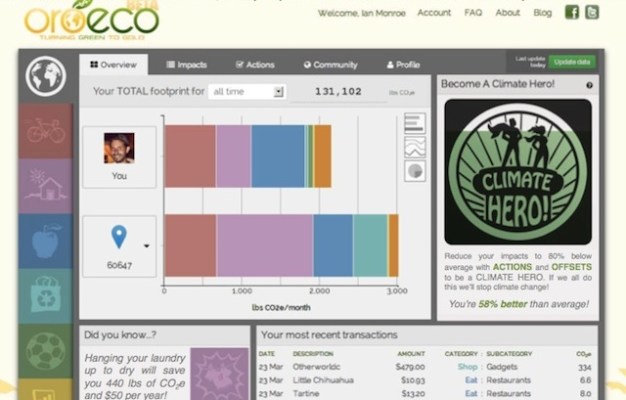I’m the kind of person who cares about their environmental impact … but aside from basics like recycling, my ideas about how to do better get kind of fuzzy. That’s why a new service called Oroeco is pretty appealing.
Since its successful Indiegogo campaign in 2012, Oroeco tested out an invite-only version of the service and then quietly opened up the website before officially launching on Earth Day (April 22, though you can sign up now).
There are other sites like GoodGuide that help users find environmentally friendly (and ethical and healthy) products, but Oroeco’s approach is closer to Intuit-acquired personal finance site Mint.com — it’s less focused on helping you buy the right products and more on influencing your general spending habits. (Both GoodGuide and Mint launched at TechCrunch conferences.)
In fact, Oroeco integrates with Mint.com, pulling your spending information from the site and using it to estimate your carbon footprint. Apparently these projections are based on data from UC Berkeley’s Cool Climate research group, and tailored based on your location and personal habits. For example, Oroeco might make one estimate based on your overall spending at restaurants, but then adjust it based on the fact that (say) you live in New York City and are vegetarian.
These are, of course, just estimates, particularly since Oroeco’s data isn’t itemized — it knows that you shopped at Whole Foods without knowing what you actually bought. But again, that should be enough to get a general understanding of your impact and how you could be doing better.
Co-founder and CEO Ian Monroe told me that one of his goals is to make the product appealing to both casual users and those who want to dig into the data. (Monroe, as well as co-founder and CTO Kirstin Cummings, attended Stanford at around the same time I did, and Cummings and I lived in the same hippie co-op.) So there are plenty of dashboards and charts showing spending data in different categories, but you can ignore those if you want and just focus on the general tips and try to improve enough that you can win badges like “Climate Hero.”
There can also be some social pressure to improve, because Oroeco allows you to connect with your Facebook friends and compare how you’re doing. (You can keep your data private if you prefer.)
And although the service is only available on the web right now, there’s an iOS app in development that should be launching soon.
Monroe, by the way, has done a lot of consulting work for corporations and government agencies around clean energy and sustainability, and he said he’s become convinced “the political solutions and activist solutions are not going to be nearly enough” to address the issue — instead, he said it’s “a massive collective action problem that requires a massive collective action solution.”
“We have all the technologies we need,” he said. The challenge, and what Oroeco is trying to do, is “encourage all of us to really scale up individual actions to solve climate change.”
As for actually making money, the basic service is free, but it will eventually offer a premium version that covers investments, too. And users can also go through the site to buy carbon offsets to help reduce their climate impact, and some of that money will go to Oroeco. (Monroe acknowledged that there’s been some debate about the effectiveness of carbon offsets, but he said the company will be vetting the offset projects that it funds.)
Monroe said Oroeco has raised about $150,000 in outside funding from Indiegogo, Start-Up Chile, angel investors, the US Department of Energy’s Energy Excelerator program, and the department’s American Energy Data Challenge.
